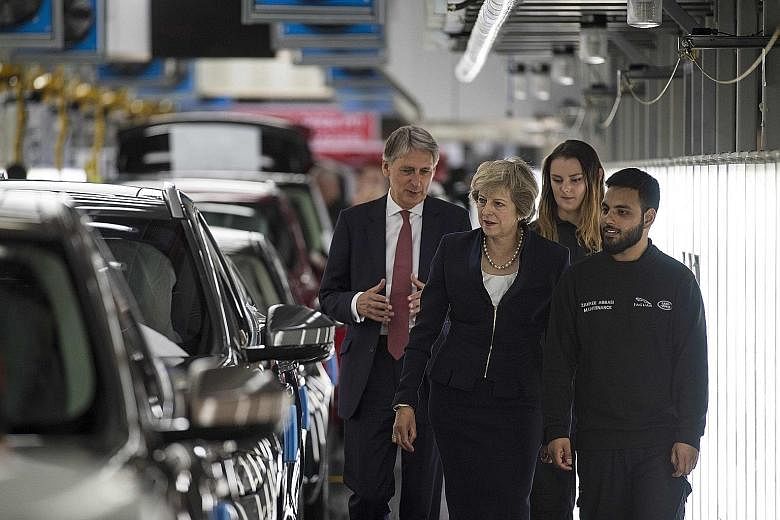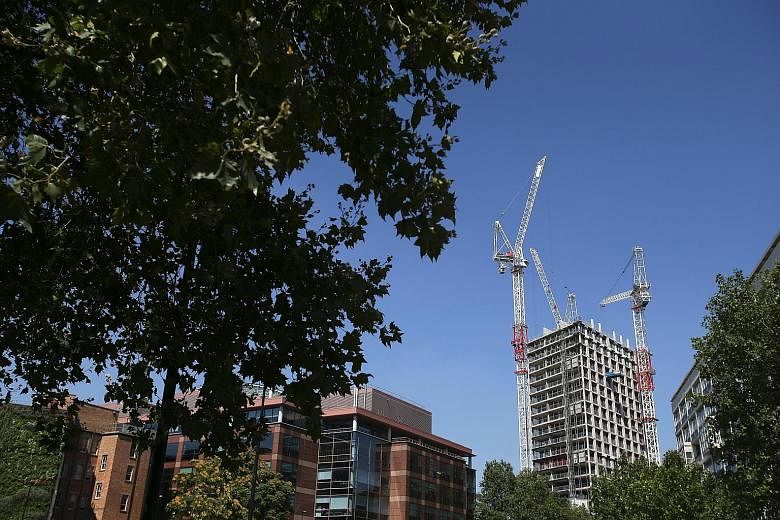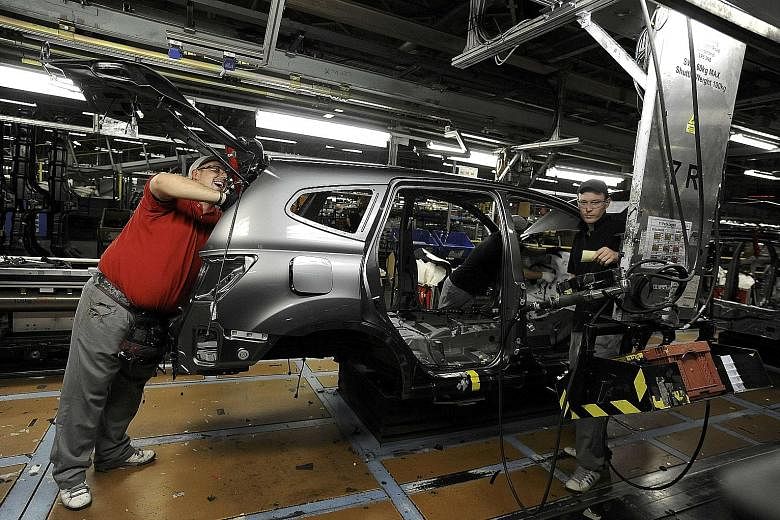Three months since the historic European Union (EU) referendum in Britain, Asian investors have hardly reacted in quite the same way to the realities of Brexit.
For some, especially those manufacturing in the UK for the European market, the uncertainty of whether Britain will still retain access to the single market is a big worry. Yet, for others less bothered about this gateway, the business-as-usual sign is still hung out front.
Japan, Asia's top investor in the UK, is especially nervous as an unfavourable Brexit negotiation could put both its goods and services at stake. Banks like Nomura face a loss of passporting rights to offer financial services across the EU, while manufacturers like Hitachi, Fujitsu and Nissan face tariffs that could make it more worthwhile to move their plants to continental Europe.
Together, Japanese firms employ more than 140,000 people in the UK - about a third of the 440,000 jobs they have created in the EU.
Given its vested interest, Japan published a 15-page memo on the eve of a summit for the Group of 20 (G-20) economies this month, as a clarion call for transparency in the negotiation process and an outcome that will be "free of unpleasant surprises".
In the memo, Japan called for existing measures such as tariff rates and the free flow of workers between the EU and UK to be kept.
University of Tokyo economist Masayuki Otaki told The Straits Times: "It is certain that additional investment in the UK is risky. However, increasing investment in continental Europe is also precarious because of the ambiguity of the impact of the UK economy."
Some Asian investors have already been hit in the aftermath of Brexit.
-
ASIAN INVESTMENTS IN BRITAIN
-
JAPAN
• Japan has more than 1,000 companies in the UK, employing more than 140,000 people and generating a combined turnover of £72 billion last year. It is the top Asian source of foreign direct investment (FDI) in the UK, at £38.2 billion in 2014.
• It invested in 115 projects in 2014/15, providing a total of 7,654 jobs.
• The investments are in sectors such as automotive, electronics and financial services. Nissan has a factory near Sunderland which makes 480,000 cars a year, more than half of which are for the EU market. Fujitsu, Hitachi and SoftBank also have significant investments in the country.
• Japan's exports to the UK in July were worth 132 billion yen (S$1.76 billion), while its imports from the UK that month were worth 51.2 billion yen.
INDIA
• There are around 800 Indian companies with operations in the UK. The Tata Group alone owns 19 companies in various sectors including steel and automotive.
• Bilateral trade between India and the UK was US$14 billion in 2015/2016. • India is the third-largest source of FDI in the UK in terms of the number of projects. Indian companies invested in 140 new projects and were the second-largest international job creator in the UK, providing a total of 7,449 jobs in 2014/15.
• Its FDI in 2014 was £2.1 billion.
CHINA
• Bilateral trade between the UK and China was US$78.5 billion last year. China is Britain's second-largest non-European trading partner.
• China's FDI in the UK was £1.1 billion in 2014. Including Hong Kong, China invested in 156 projects in 2014/15, with jobs totalling 6,732. • Chinese players include Dalian Wanda, which is building a hotel and residential development in London's Nine Elms, and state-owned China General Nuclear Corporation, which is pumping £6 billion into the just-greenlit Hinkley Point nuclear power station.
HONG KONG
• Hong Kong accounted for £12.8 billion of FDI in the UK in 2014.
• Almost 70 per cent of Chinese FDI in the UK went through Hong Kong.
• Hong Kong tycoon Li Ka Shing has invested £25 billion in the UK since 2010 in utilities, port services, retail services and mobile telecommunications.
• Britain takes up just 1.5 per cent of Hong Kong's total exports. Britain's exports in goods and services to Hong Kong amount to £8 billion every year.
SOUTH KOREA
• South Korea exported US$7.39 billion worth of goods to the UK last year, which is just 1.4 per cent of its total exports. Top exports include cars, semiconductors, ships, mobile phones and jet fuel.
•There are about 100 South Korean firms that have ventured into the UK, including tech giants Samsung and LG, and carmakers Hyundai and Kia.
• Its FDI in the UK in 2014 was £2.3 billion. It invested in 22 projects in 2014/15, creating 522 new jobs.
• Korean Electric Power Corporation is in talks to ink a deal for a £10 billion nuclear power station in Cumbria.
MALAYSIA
• Malaysia invested RM21.3 billion (S$7 billion) in Britain in 2014, with the bulk of the investments coming from public-listed companies and government-controlled funds.
• The money is mostly in property, as well as utilities and gaming.
• The iconic Battersea Power Station residential project is funded by state-run asset management firm Permodalan Nasional Berhad and the Employees' Provident Fund. •FDIs based on latest figures by UK's Office of National Statistics
•FDI project and job figures based on latest statistics by UK Trade & Investment
Indian IT firm Infosys lost a multimillion-dollar contract after Royal Bank of Scotland last month withdrew plans to set up a separate bank in the UK after the referendum. Tata Motors, which owns British firm Jaguar Land Rover (JLR), saw its profit halve in the quarter ended June 30, partly because of a fall in the pound.
"We are seeing the early signs. Clients are cautious… There is caution in pockets," said Infosys CEO Vishal Sikka recently.
There are around 800 Indian companies with operations in the UK. Tata Group alone owns 19 companies in different sectors including steel where it announced plans in March to sell off its UK business due to heavy losses. After Brexit, Tata Steel has instead moved towards partial disinvestment and is looking for potential joint ventures.
JLR said it is too early to tell what impact Brexit will have on its business. "We are still a key part of the European automotive business and economy, and that will also continue. There will be a significant negotiating period (on Brexit) and we need to understand more about that as details emerge," said a JLR spokesman.
Hong Kong's richest man Li Ka Shing saw share prices for his CK Hutchison Holdings and Cheung Kong Infrastructure Holdings fall by more than 8 per cent in the wake of Brexit. But he does not plan to pull his investment out of Britain yet, saying his telecom-to-ports operations in Britain are "predominantly resilient", and that he expects his investments in Britain and Europe to generate "reasonable returns".
Britain is CK Hutchison's biggest profit generator, accounting for over a third - HK$15.4 billion (S$2.7 billion) - of its earnings before interest and tax for the first half of this year. With exports to EU and Britain respectively taking up 9 per cent and 1.5 per cent of Hong Kong's total exports, compared with shipments to China which account for over 50 per cent of the city's exports, the impact of Brexit on Hong Kong is less prominent than China's slowdown, said OCBC analyst Tommy Xie.
Likewise, the effect of Brexit on South Korea's economy will be relatively low, as its share of trade with the UK is not large compared to other countries, like the US and China, said experts.
South Korea exported US$7.39 billion (S$10 billion) worth of goods to UK last year, which is just 1.4 per cent of its total exports. Its top exports include cars, semiconductors, ships, mobile phones and jet fuel.
Carmakers Hyundai and Kia sold a combined 166,606 cars in the UK last year, which translates into a 6.33 per cent market share. Tech giant Samsung, meanwhile, is second to Apple Inc in mobile phone sales in the UK. The conglomerate also has stakes in the semiconductor and biomedical industries there.
Analysts say companies and investors are waiting to see how Britain's departure will be finalised over the next two years, and how its trade relations with the EU will pan out, before making any major decisions.
Economist Lee Doo Won from Yonsei University believes there is still a lot of room for South Korea-UK collaboration, and South Korean companies are willing to take risks to conquer new markets.
"Korea is generally very strong in manufacturing, but we have a lot to learn from the UK in terms of services, especially in the finance industry. Then we can enjoy complementary trade and investments."
The country has declared its intention to pursue a separate free trade agreement with the UK and is in talks to join a consortium project to build a £10 billion (S$17.8 billion) nuclear power plant in Cumbria in the north-west.
China, too, has begun talks with Britain on a free trade deal that would give Chinese companies greater access to the UK economy. Last week, British Prime Minister Theresa May approved an £18 billion nuclear power station funded by France and China. Two more are in the pipeline - in Suffolk and Essex - developed by the Chinese.
Experts and government officials in Beijing generally agree that Brexit will have a limited impact on Chinese investors.
"Chinese investments in Britain are broadly divided into two types - property investments and acquisitions of technology firms by financial institutions," said economist Li Daokui from Tsinghua University at the World Economic Forum just after the referendum. "As these two types of investments are dependent on Britain's domestic economy, they are not affected by the impact of Brexit," he added.
Attracted by the slide of the pound and attractive valuations post-Brexit, property agents and analysts said more Chinese buyers are showing interest in properties in the UK, especially in London.
Earlier this month, investment fund China Minsheng Investment bought French bank Societe Generale's London headquarters office for £84.5 million, while property giant China Vanke picked up an office building in Central London for £115 million.
Malaysian developer SP Setia said it has sold 85 per cent of the 1,661 units of the iconic Battersea Power Station development in London, which will be completed by 2025.
Another stakeholder, Malaysia's state Employees' Provident Fund, which holds a 20 per cent share in the development, is looking at opportunities elsewhere, either in Europe or in non-property sectors in the UK, a source told The Straits Times.
"The UK will be literally 'on sale,'" Cornerstone International Properties director Virata Thaivasigamony said in the aftermath of the vote.
It is a sentiment echoed by tycoon Francis Yeoh, whose TYL Corp, one of Malaysia's largest investment holding groups, is hunting for post-Brexit bargains.
The company, which has utilities and property in its UK portfolio, is looking for infrastructure utility assets over the next two to three years.
• Walter Sim in Tokyo, Chang May Choon in Seoul, Chong Koh Ping in Beijing, Nirmala Ganapathy in New Delhi, Joyce Lim in Hong Kong and Shannon Teoh in Kuala Lumpur contributed to this report.




